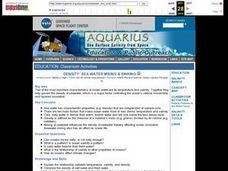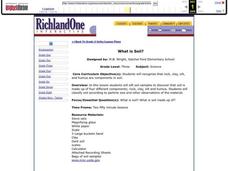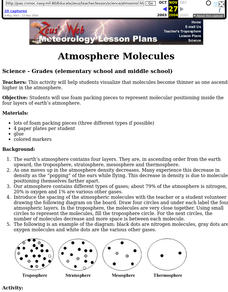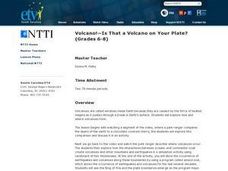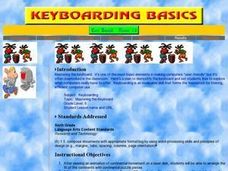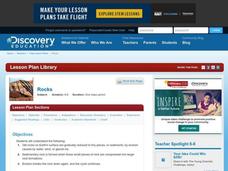Curated OER
How Much is Dirt Worth?
Fourth graders graph the percentages of the materials that make up the Earth and complete computations based on their results. In this topsoil lesson, 4th graders diagram the different layers of Earth's composition.
Curated OER
Earth Science: The Structure of the Earth
Students identify and complete activities about the structure of the Earth. In this Earth structure lesson, students view a Powerpoint about the Earth's layers and complete a diagram. students compare temperatures in the Earth's layers...
Curated OER
Cruising the Mantle
Students explore the plate boundaries of the earth. Through the use of video, internet and hands-on activities, students examine the types of plate boundaries. They create a model to illustrate the movement and interaction of the...
US Environmental Protection Agency
Building an Model Aquifer
With almost half of Americans relying on groundwater supplies, it is more important than ever to protect aquifers from possible contaminants. Working in small groups, young environmentalists explore this problem as they create an aquifer...
Curated OER
Earth's Plate Tectonics
Students identify the different layers of the Earth. In this earth science lesson, students create a model of the crusts and continents. They explain how plates movement cause earthquakes and volcanoes.
Curated OER
Fossil Fuels (Part II), The Geology of Oil
More of a mini-unit than a lesson plan, these activities lead inquisitors through a survey of oil deposits. In the first part, they read about and view diagrams of sedimentary rock layers that trap oil. Next, they test porosity and...
Curated OER
Sea Water Mixing and Sinking
Middle schoolers investigate the role of temperature and salinity in determining seawater density. They use a Temperature-Salinity Diagram to examine the effects of mixing on density.
Curated OER
What is Soil?
Third graders examine what makes soil by creating a Venn Diagram. In this Earth environment activity, 3rd graders identify the different components that soil is made from. Students bring soil from their homes to examine and create...
Curated OER
Atmosphere Molecules
Students use foam packing pieces to represent molecular positioning inside the four layers of earth's atmosphere. This lesson plan help students visualize that molecules become thinner as one ascends higher in the atmosphere.
Curated OER
Ecosystems Beneath the Surface
Sixth graders create a KWL chart about microorganisms. In this biology lesson, 6th graders create and label a diagram on a microbial mat. They investigate the processes involved in the carbon, oxygen and sulfur cycles.
Curated OER
Stressed to a Fault!
Eighth graders describe how stress builds up in the Earth's crust by the movement of tectonic plates. In groups, they relate the three types of stresses to the types of plate movements and explain how the stress causes faults to form. ...
Curated OER
Volcanoes
Students study volcanoes. In this volcanoes lesson, students read several volcano paragraphs and study the pictures or diagrams. Students then make an erupting volcano, complete website research about volcanoes, and answer several...
Curated OER
Modeling Oil and Gas Reservoirs
Students investigate energy by researching how oil reservoirs work. In this fossil fuels lesson, students conduct an experiment using a half full bottle of water, corn oil and oxygen, recording their data as the elements are mixed...
Curated OER
It looks Like Champagne
Young scholars interpret phase diagrams and explain the meaning of vocabulary words. In this ocean explorer lesson students describe two uses of super-critical carbon dioxide.
Curated OER
Earthquakes
Students observe the melting of ice. In this phase change lesson, students observe ice as it melts. They discuss the process and create a Venn diagram comparing water and ice.
Curated OER
Law of Superposition
Students identify the law of superposition and it states that beds of rock in a series are laid down with the oldest at the bottom and younger layers on the top. They construct a legen for a block diagram and construct a block diagram...
Curated OER
It Looks Like Champagne
Students determine some practical implications of the discovery of liquid carbon dioxide in deep-ocean ecosystems. They interpret phase diagrams and explain the meaning of "critical point" and "triple point."
Alabama Learning Exchange
Action at Plate Boundaries
Students diagram the spreading of the ocean floor. In this earth science lesson plan, students read an article on plate boundaries of the ocean. Students are expected to diagram the oceanic convergent boundary, and...
Curated OER
Volcano! Is That a Volcano on Your Plate?
Young scholars investigate where volcanos come from. In this volcano lesson, students watch videos do Internet research and participate in experiments to discover the cause of volcanos.
Curated OER
Mastering the Keyboard
Sixth graders view an animated program showing how the continents fit together millions of years ago. In groups, they compare and contrast the distribution of rocks and fossils based on how the continents fit together. After reading a...
Curated OER
Rocks
Young scholars examine how sedimentary rocks are formed. In this rock activity students research different rock formations and different types of rock.
Curated OER
Structural Geology Laboratory
Students explore modeling of geologic structures in experiments. They study how compressive and tensile forces produce these structures. The compression makes the flatlying strata shorter and tension make the strata longer.
Curated OER
Exploring Rocks
Students recognize differences in the size, shape, texture, and color of different rocks. For this rocks lesson plan, students also learn and repeat back how a volcano erupts and make one out of a toilet paper tube.
Curated OER
Keep It Cool
Students complete a science experiment to study insulation, heat transfer, and permafrost. In this permafrost study lesson, students design and test a soda insulator. Students graph their class data and discuss the results. Students...






